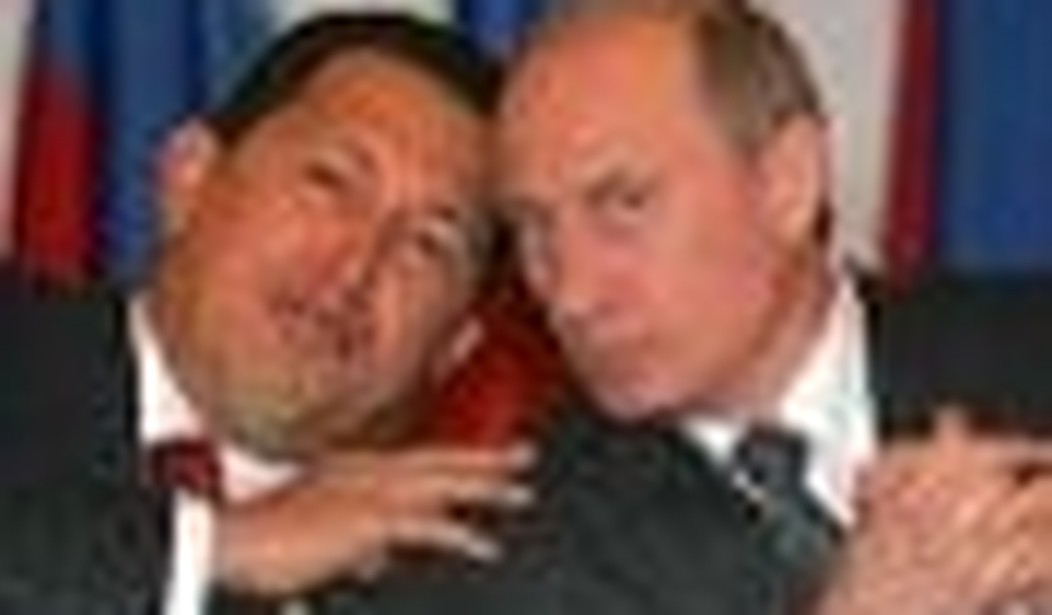Forty-six years ago this week, the Cuban Missile Crisis was resolved when President John F. Kennedy agreed to remove U.S. missiles from Turkey. In his pact with Nikita Khrushchev, Kennedy also agreed that the U.S. would neither invade Cuba nor allow an exile invasion of Cuba, a decision that converted America from Fidel Castro’s enemy to his de facto protector. The Soviets, for their part, agreed to remove the missiles they had snuck into the island nation under Kennedy’s nose.
Just a year after the missile crisis Kennedy would be assassinated by Lee Harvey Oswald, a communist admirer of Fidel Castro, and Cuba would remain an important client of the Soviet Union for the duration of the Cold War.
Well, global warming be damned; it may not be another Cold War yet but it’s starting to get very chilly in Latin America thanks to a Russian breeze that’s blowing in from across the Atlantic. On Monday, Reuters reported, “The Russian and Cuban military will exchange experience in organizing tactical air defense and in training officers.”
This is the latest in a series of eyebrow-raising actions by Russia in Latin America. In September, two Russian strategic bombers landed in Venezuela to conduct “training missions.” Also in September, Russia announced that it would dispatch warships to Venezuela to conduct joint exercises in November.
One thing is certain; Russia is trying hard to get attention from the U.S. Or perhaps it’s simply trying to unload weapons in exchange for Venezuelan petrodollars. Or probably both.
Russia under Putin and now Dmitry Medvedev, Putin’s puppet president, has acted in ways that are reminiscent of the bad old days of the “evil empire.” Many observers believe Russia is acting out in response to NATO’s expansion, which has left Russia surrounded by former Soviet states that are now allied with the U.S. Some also see these actions as a response to proposed missile defense systems in Europe.
But the more practical reason for Russia’s sudden interest in Latin America is probably not a desire to reignite the Cold War but instead to generate cold, hard cash. The Castro brothers, despite having personal fortunes estimated in the hundreds of millions of dollars, won’t dedicate the kind of resources necessary to buy Russian weapons on their own. Putin and company certainly are aware of Cuba’s Soviet-era debt, which the New York Times estimated to be $20 billion in 2000, a debt that Cuba refuses to even acknowledge.
Besides, Russia will be very careful in its dealings with Cuba, not just because the Castros are deadbeats but also because ironically, as Professor Jaime Suchliki of the University of Miami’s Institute for Cuban and Cuban-American Studies pointed out to me, the Russians are still bound by the Kennedy-Khrushchev pact that ended the missile crisis and was never abrogated.
That’s why Russia’s focus has not been solely on Castro’s Cuba but instead on Chavez’s Venezuela. This coziness with the Castro brothers’ benefactor, Hugo Chavez, allows Russia to kill two birds with one stone. It puts a burr under the saddle of U.S. foreign policy in our own backyard and generates revenue from a democratically elected president-cum-dictator with delusions of grandeur and plans for regional hegemony.
Suchliki estimates that Venezuela has already purchased $4 billion in weapons from Russia, including 24 Sukoi fighter-bombers, 53 helicopters, 14 jet fighters, and surface-to-air missiles. In July of this year Chavez announced that he’d buy another $30 billion worth of Russian weapons. Whether that’s hyperbole or not, Venezuela is currently Russia’s third leading purchaser of weapons behind only China and India.
The next American president will have to deal not only with the wars in Iraq and Afghanistan, a potentially nuclear Iran, and a positively nuclear Pakistan and North Korea, but also an increasingly belligerent Russia and its allies led by crackpot despots — a tall order that might make some long for the simplicity of Cold War 1.0.









Join the conversation as a VIP Member